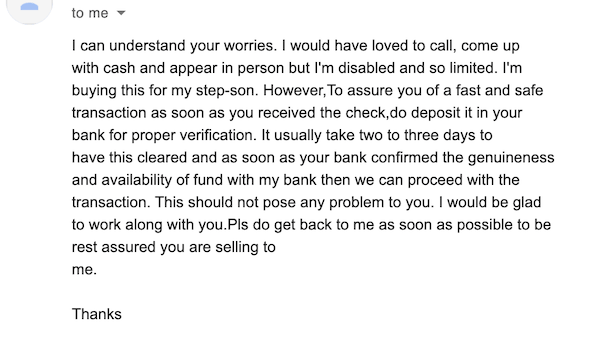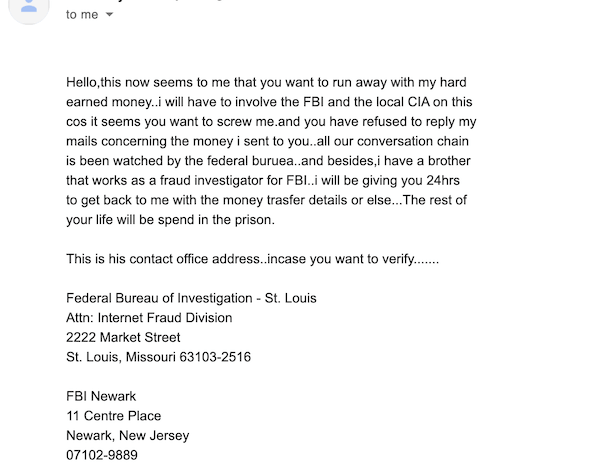Craigslist is a wonderful place to find a deal. It’s also a great place to get swindled.
Founded in 1995, Craigslist scammers have had decades to evolve. You should prepare yourself as best you can before you make any transactions through the website.
How to Avoid Getting Caught in a Craiglist Scam
Getting caught in a Craigslist scam at any level is no fun. At best, you spot it early and realize your ‘incredible deal’ was no deal at all. At worst, you see the ‘deal’ through to its end and wind up losing your hard-earned money for nothing at all.
Follow these guidelines if you want to avoid the stress, inconvenience, and financial hardship of getting scammed.
1. Requests For Transfers of Funds
The overwhelming majority of Craigslist scams involve people you will never see face-to-face. And if they want to get your money, you have to send it to them willingly.
That’s why the words ‘Western Union’ or ‘MoneyGram’ or ‘PayPal’ should set off a blaring alarm in any Craigslist deal. The popular wire transfer services will often come up at some point in a bogus deal.
Sometimes these conmen will enlist a third-party entity to ensure the transaction is ‘officially certified’ and safe. It’s not.
As Craigslist explains on their website, all transactions are between users only. If they claim to be certified by an official-looking third party, or Craigslist itself, they are lying.
You should always deal in cash, face-to-face.
2. Stories (Especially Emotional Ones) Are a Red Flag
Often, scammers’ requests for funds transfers will come at the end of a long, drawn-out story about why they can’t meet face-to-face. And they will try to pull at your heartstrings. Check out one such scammer’s attempt to trick the author:

This fraudster claimed to be a disabled person who was just trying to help out his stepson. They try to get you emotionally involved so you can no longer think critically.
Craigslist is a place to complete a transaction, not learn somebody’s life story. Excessive storytelling doesn’t guarantee it’s a scam, but most scams involve one.
3. ‘Incredible Deals’ Are Usually Incredibly Fake
Whether it’s the deal of a lifetime on a new car or a Manhattan penthouse for $400/month, amazing deals are usually just an attempt to swindle you out of money.
Scammers will pose as landlords just looking for somebody, anybody, to take their incredibly appealing rental at a monumental discount. As you might guess, they usually claim to be ‘out of town’ and unable to show you the apartment.
Check out one such scammer using an emotional story by claiming he was away serving on a religious mission:

It almost sounds too good to be true. And it was. Rental scams like this usually involve the ‘landlord’ collecting application fees or deposits when there is no actual rental property available.
While you can find legitimate, excellent deals on the website, be extremely cautious around deals that seem downright generous. And never rent a property that you haven’t visited in person.
4. Never Accept Cashier’s Checks or Money Orders
Fraudsters often try to devise a way to ‘overpay’ you, so you have to send them money back. Maybe you’re applying for a nanny job, and they send you a check to cover expenses. They might ask you to send them some of the money back through your own account. The problem is that they’re getting your real money, and you’re left with their fake money.
Or take the above case of the ‘disabled’ do-gooder buying a table for his stepson.
The scammer sent an official-looking cashier’s check without the author’s consent. After expressing doubt, the scammer responded with threats of legal action:

Once the talk of real attornies was brought up, the scam artist never responded.
Again, cash is king. If they can’t meet and pay you in person, it’s not worth the risk.
5. Be Very Cautious With Your Personal Information
Conmen can acquire your sensitive information through a bogus job application or a fraudulent background check. Make sure the job offer or the apartment application links back to a real website with a real phone number that enables you to speak with a real person.
Frauds can lift your sensitive information and use it to steal your identity or try to crack your passwords, or gain access to your accounts.
If you feel you’ve been involved in a scam, reach out to Craigslist at abuse@craigslist.org. And if you fear you’ve given away sensitive information to a scammer, reach out to Hacked.com for immediate help.
Featured image by rafapress via Shutterstock.com